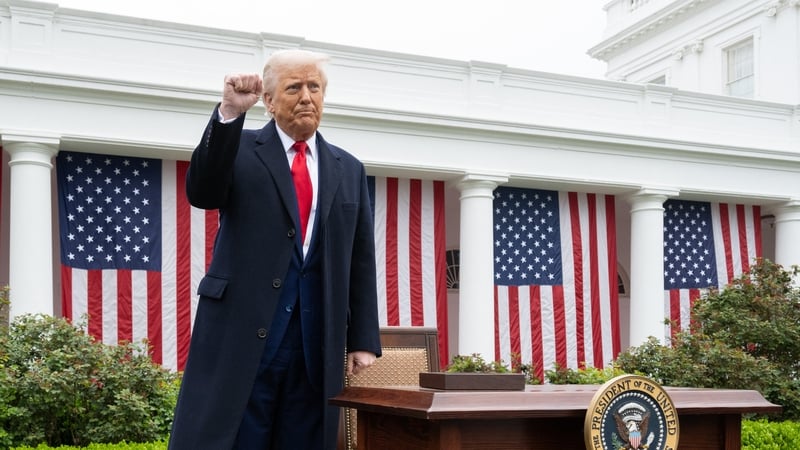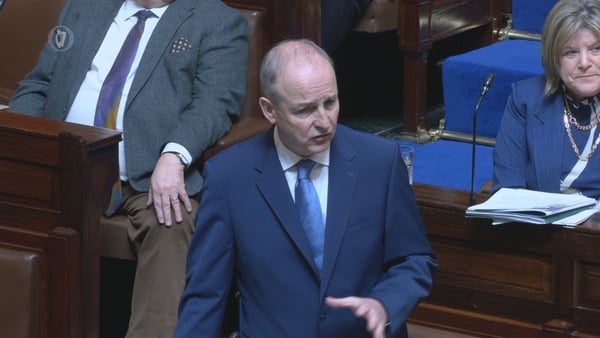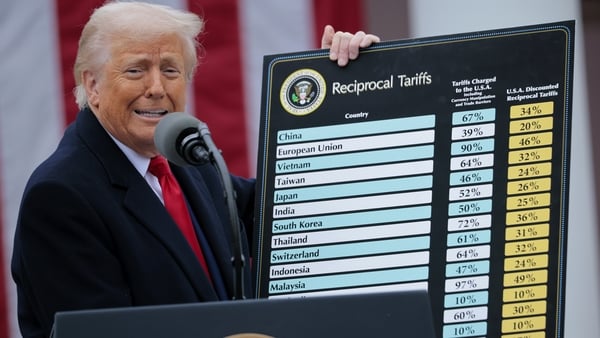"I, Donald J Trump, President of the United States of America, find that underlying conditions, including a lack of reciprocity in our bilateral trade relationships, disparate tariff rates and non-tariff barriers and US trading partners' economic policies that suppress domestic wages and consumption, as indicated by large and persistent annual US goods trade deficits, constitute an unusual and extraordinary threat to the national security and economy of the United States.
"That threat has its source in whole or substantial part outside the United States in the domestic economic policies of key trading partners and structural imbalances in the global trading system.
"I hereby declare a national emergency with respect to this threat."
So begins the executive order signed in the Rose Garden of the White House yesterday evening that has set off what might be the biggest disruption to global trade since World War II.
A national emergency, no less.
An emergency that has crept up on the US with the connivance of previous presidents, or as the White House communications office put it: "After being sold out by career politicians for generations, President Trump is enacting fair trade policies that will restore our workforce, rebuild our economy and finally put America First".
President Trump said the idea behind reciprocal tariffs is "what they charge us, we charge them". If that were the case, then the EU would have little to complain about.

The president's executive order cites World Trade Organization statistics on the so-called "most favoured nation" tariff rates (MFN) - the average tariff regime countries apply to fellow WTO members.
He said the US MFN rate is 3.3% and the EU rate is 5%, China’s is 7.5%, Brazil 11.2 and India 17%.
So how did we end up being accused of charging US goods a 39% tariff - which was on the chart the president held up at his news conference? But because he is so nice, he is only charging half that amount - 20% - as the new "reciprocal" tariff on EU goods, apart from cars and steel, which are hit with a separate 25% tariff regime.
The answer lies in two places - non-tariff barriers, such as technical, health or environmental regulations, and VAT.
The sales tax, used in some 150 countries, not just the EU, is considered by the Trump administration to be an extra tariff on US imports.
It's not. It's a sales tax that applies to all goods, whether they are made in the EU or not.
The Americans say there is no US sales tax. True, but US states have their own sales taxes and as pointed out before, the Heritage Foundation in its so-called Project 2025 blueprint for the second Trump administration recommends the introduction of a VAT-like tax in the US as a sensible fiscal measure.
Post-Brexit anxiety
European governments are not going to allow US goods to be sold in the European Union VAT free when EU producers are charged VAT - that would provoke bloody revolution.
Additionally, they are not going to scrap a very good, stable revenue source either.
So, nothing is going to move on VAT, it's just there to annoy people. Besides, the British charge VAT as well, but they are only being hit with a 10% tariff by the Americans, which puts the role of Northern Ireland and the Windsor Framework arrangements back in the spotlight.
It is known from the Signal leak around the bombing attack on Yemen that the current administration has a special loathing for the EU, so this differential may be part of what US President JD Vance called "the president’s messaging around Europe", stirring up a bit of post-Brexit anxiety.
Particularly in Ireland.

But there is plenty of dissatisfaction with the EU on display in the executive order, and at greater length and detail in the 2025 US Trade Representative’s report on foreign trade barriers, published two days ago, that sets out what might be the "EU red tape stuff" the Americans don’t like.
These include import barriers and licensing restrictions, customs barriers and shortcomings in trade facilitation, technical barriers to trade, sanitary and phytosanitary measures that unnecessarily restrict trade without furthering safety objectives, inadequate patent, copyright, trade secret and trademark regimes and many others.
Speaking of Ireland, there is a strange exclusion of pharmaceuticals from the "ad valorem rates of duty" set out in the executive order.
Fear of a big hit on Ireland's most valuable export to the US have been building for over a year as President Trump during his campaign for election only mentioned Ireland in relation to the movement of US pharmaceutical plants abroad and his intention to force them back to the US.
But so far, no tariffs on Viagra, Botox and the rest of it.
Presumably, because of uncertainty about the impact on the US supply chain - the vulnerability of which was exposed during the Covid-19 pandemic.
But Ireland does get a direct mention in the executive order - apparently because we are not consuming enough stuff. The order said that consumption as a share of GDP in the US is 68% - hence the nickname 'the consumer of last resort'.
But the report said the share of consumption is much lower in other - export oriented - countries.
It lists the big offenders, starting with Ireland - where consumption is 27% of GDP - followed by Singapore at 31%, China at 39%, South Korea at 49% and Germany at 50%.

How did it get to this? Speaking on The Hannity Show on Fox News last night, US Commerce Secretary Howard Lutnik blamed "soft politicians" for allowing foreigners to walk all over the Americans.
"I mean, the European Union won't take chicken from America. They won't take lobsters from America. They hate our beef because our beef is beautiful and theirs is weak," Mr Lutnik said.
Weak beef? If only we had known. But gym memberships for the national herd are probably not the solution. Trade talks, probably, are.
But Mr Lutnik was keen to put the spotlight back on VAT, which he classed as a non-tariff barrier.
He said foreign governments "provide subsidies back like they charge this VAT, right? And they always say, 'oh, it's not the VAT tax’".
"You know what some of these countries do? They take that 20% tax and they give it back to their producers, so they crush our people. It's got to end," he added.
Clearly the US wants a big overhaul of the way the world trades with them, if it were only a matter of tariff rates that would be fairly straightforward.
However, by lumping in everything else they are unhappy about - including VAT and technical barriers to trade - the US has greatly widened the areas for discussion and with 60 countries on the list, they have greatly expanded the number of players to be dealt with.
It's not a recipe for a quick resolution.
'Take a deep breath'
In the meantime, Treasury Secretary Scott Bessant called on the newly tariffed countries to sit and wait, and not retaliate.
Speaking on CNN, he said: "The message I would like to get out tonight is everybody sit back, take a deep breath, don't immediately retaliate.
"Let's see where this goes because if you retaliate, that's how we hit escalation and then it becomes a fully-fledged trade war."

While all this was going on, European Commission President Ursula von der Leyen - the body charged with defending European trade interests - was in Uzbekistan, at the first EU-Central Asia summit.
At 4am Irish time, she stood before the cameras and made a prepared statement responding to what had happened in Washington. There was very little talk of retaliation - it's to be kept as an option in case talks with the Americans fail.
But retaliatory measures are being prepared, just in case.
Ms von der Leyen agreed with Mr Trump that some countries have taken advantage of the global trading rules and she pledged to work to reform them. She added that she is ready to begin immediate talks with the US on eliminating transatlantic trade barriers.
But mostly she spoke of the damage the Trump tariffs are going to do, calling them "a major blow to the world economy" - which she said will suffer massively.
The EC President said the consequences will be dire for millions of people around the globe, including some of the poorest people on the planet and she deeply regretted the US move.
She said all businesses, big and small, will suffer from day one of the US tariff regime, adding the cost of doing business with the US will drastically increase.
There was no sign of rushing into retaliation.
No sign either of sitting back and taking a deep breath - a keenness to get into the detail of negotiations with the US as soon as possible was the clear tenor of the statement.
The US needs to move quickly as well - recession talk is gathering pace and there is a mid-term election in 19 months' time.
How long either side can hold out is of crucial importance. A few months, perhaps, before real damage sets in and makes a difficult task much harder.
The US has gotten us and them into a dark and dangerous place.
Hopefully their plan includes several exit routes that can be used as needed.





